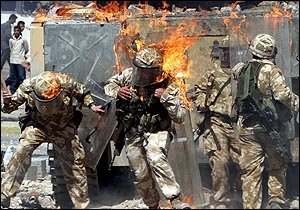Head of British Army: We should leave Iraq "soon"
 General Sir Richard Dannatt, the head of the British army, dropped a bombshell yesterday by saying that British troops must withdraw from Iraq "soon" and saying that our presence there was hurting British interests in Iraq and around the world.
General Sir Richard Dannatt, the head of the British army, dropped a bombshell yesterday by saying that British troops must withdraw from Iraq "soon" and saying that our presence there was hurting British interests in Iraq and around the world.
This is unprecedented from an army chief of staff. And from radio reports I heard last night it seems that the armed forces are very happy that Dannatt has made his views clear, as the views he is expressing are widely held by troops on the ground."I don't say that the difficulties we are experiencing round the world are caused by our presence in Iraq, but undoubtedly our presence in Iraq exacerbates them," he said in comments that met with admiration from anti-war campaigners and disbelief in some parts of Westminster.
In an interview with the Daily Mail, Gen Dannatt, who became chief of the general staff in August, said we should "get ourselves out sometime soon because our presence exacerbates the security problems".
He added: "We are in a Muslim country and Muslims' views of foreigners in their country are quite clear.
"As a foreigner, you can be welcomed by being invited in a country, but we weren't invited ... by those in Iraq at the time. The military campaign we fought in 2003 effectively kicked the door in.
"Whatever consent we may have had in the first place, may have turned to tolerance and has largely turned to intolerance." He added that planning for the postwar phase was "poor" and the aim of imposing a liberal democracy in Iraq had been over-ambitious. He was more optimistic that "we can get it right in Afghanistan."
There are now calls for Dannatt to be removed from his position - a rather predictable case of "shoot the messenger". What's stunning is how quickly the discussion has moved onto, "should he have said that?" rather than any serious discussion of what Dannatt is saying.
Mr Henderson rather misses the point if he thinks the troops will be asking why they are there based solely on Mr Dannatt's comments, rather than recognising Dannatt's comments as a verbalisation of a question the troops had themselves long ago formulated.Doug Henderson, a former minister for the armed forces and ally of Gordon Brown, questioned why the general had made his thoughts public.
"One can only assume that Sir Richard has made his views known privately and that they've been ignored," he told BBC2's Newsnight programme. He said soldiers expected to have the support of the chief of the general staff, adding: "The soldiers on the frontline must be wondering why they are there now."
Ministers have been quick to state that this is unacceptable interference in political matters by a serving soldier, rather ignoring the point that soldiers on the ground have a much better understanding of the reality in Iraq than an MP in the safe environment of Westminster mouthing Bush platitudes about, "Staying the course".
Both Bush and Blair have stuck to their meaningless formulas for when we should leave Iraq - standing down as the Iraqis stand up etc - but it is now clear that the soldiers who have been asked to carry out this task do not think it is achievable.
So now Blair has lost the support of the Head of the British Army. The whole Iraqi mission has been a disaster. The invasion was supposed to bring freedom and democracy to Iraq but it's actual legacy has been kidnappings and daily murder and the transformation of Baghdad into the most dangerous city in the world."I think history will show that the planning for what happened after the initial successful war fighting phase was poor, probably based more on optimism than sound planning.
"The original intention was that we put in place a liberal democracy that was an exemplar for the region, was pro-West and might have a beneficial effect on the balance within the Middle East. That was the hope, whether that was a sensible or naïve hope, history will judge. I don't think we are going to do that. I think we should aim for a lower ambition."
I'm even leaving aside yesterday's reports of 655,000 Iraqis killed as the arguments surrounding that are a distraction from the all too plain reality that Iraq is disintegrating in front of our eyes - and the unprecedented news that this view is now being openly expressed by the head of the British army.
Against this actuality the phrase, "Staying the course" is beyond an insult. It is an abdication of responsibility, an ostrich's response to a disaster, a veritable sticking of one's head in the sand for the simple reason that Bush and Blair have no other answer to the calamity they have unleashed on that part of the world.
The most important point he has raised is the one that undercuts both Bush and Blair's strategy of "standing down as the Iraqis stand up". At what point do we accept that rather than helping to reduce the violence, our presence actually exacerbates it?
When do we consider that we are not helping to fix the problem but, rather, that we have become the problem?
How many more British and US troops - how many more innocent Iraqis - must die in order to save Bush and Blair from facing up to the heinous mistake that was the war they wilfully unleashed in Mesopotamia?
Click title for full article.
tag: General Sir Richard Dannatt, head of the British army, , Iraq, Iraq war, "Stay the course", British, troops, should, withdraw,























No comments:
Post a Comment